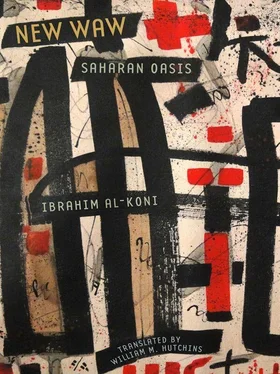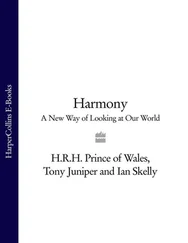The market for general merchandise occupied the center of the oasis on the south. This open area, which lay parallel to the well on the west, was now threatened by urban sprawl and the aggressive building boom. Earlier it had been a pasture for their herds and a savannah covered with acacia trees.
Caravans converged here from every direction. Those from the South brought loads of dates and palm products like palm-fiber rope, sacks woven from this fiber, platters made of palm fronds, and logs of palm trunks to be used in building roofs. Caravans from the Southern forests brought back cargoes of gold dust, ostrich feathers, elephant tusks, and the hides of wild animals. From the North came caravans bringing grains, oils, textiles, and some items made of metal. In the oasis market, goods were exchanged and barters concluded. Commerce’s feverish infection spread to the inhabitants, who avidly initiated heated negotiations. Then merchants formed alliances or revived old friendships that had been sacrificed to the pursuit of gold dust. So they convened around tables laden with food and concluded with fellow merchants deals that their renewed pursuit of wealth would soon infect with the plague called forgetfulness. All the same, they would never tire of striking new deals when they chanced to meet in the markets.
Caravans stocked up on water and supplies in the oasis. Frequently pack animals were relieved of their loads of merchandise or at least their burdens were lightened. Other caravans meanwhile sought to increase their loads with other goods. During its years of prosperity, caravans made their way to the oasis from the North, South, and West to buy goods from its markets, which were richly stocked with the most precious items. They took advantage of its proximity, plentiful water, low tax rates, and its markets’ ample supply of even the rarest merchandise. Older merchants would frequently observe with amazement to one another, “We passed by this spot repeatedly and found it a harsh, deadly wasteland. After seeing it now, how could we dare claim that heaven has grown stingy with its miracles? Doesn’t this mean that when the Spirit World looks favorably on a lineage, it creates wealth from nothing?”
4
These commercial caravans had brought many people to the oasis since its first years. Some came to seek their fortune, and others arrived en route to other destinations but were tempted by the land and bonded with the newly born oasis because of the alluring opportunities provided by its development. So they deemed it a promising location and settled there. A third group consisted of world travelers and adventurers who roved the deserts from wanderlust, fleeing from rumors about them and attempting to lose themselves in foreign realms. They hoped that luck would smile on them and that one day they would discover their true potential.
Artisans, merchants, women entertainers, and tramps settled in the oasis. At first they resided in its only guesthouse. Then they leased houses in the more frequented alleys. Over time some immigrants started to adopt alien ways and formed gangs and cliques that through their conduct and character soon provoked the original inhabitants. Then disputes broke out, rivalries were spawned, and the wick of civil disturbance was lit. Citizens complained and brought the matter to the Council. Its nobles met in the one building erected on the hill to the west of the mausoleum. They consulted with each other, debated with each other, and disagreed with each other. The first faction alleged that the foreigners had introduced weird heresies to the land and that the tribe would eventually realize the danger, because these violated the Law and threatened to pollute the inhabitants, whose souls’ purity would be destroyed in the near future. This faction advocated cleansing the oasis of the contamination by expelling these intruders at the earliest opportunity. The second faction considered the droves of immigrants to be an asset for the tribe and a benefit that no burgeoning oasis could dispense with. They observed that most of the new arrivals were craftsmen, skilled workmen, and artisans. Therefore markets in the oasis would benefit greatly from their influx, which would certainly spur the development of crafts, create jobs, and invigorate life in the oasis.
When the consultative assembly did not reach a consensus, the sages recommended recourse to the mausoleum. There they raised with the female diviner the issue of the fate of the foreign migrants. The Virgin rested her head on the stones all night long; in the morning she sent the leaders the following dictum: “There is no good in a land that the feet of foreigners have not trod.” The nobles repeated this inspired dictum with all the solemnity due a prophecy. They recited this talisman to themselves before seeking out representatives of the immigrants to share this good news with them.
5
The immigrants acquired the right to stay in the oasis in exchange for payment of a regular poll tax. Laws were drafted to formalize their relations with the original inhabitants. These imposed on immigrants respect for the customary laws of the oasis and deference to the dictates of the Law. Immigrants were forbidden from interfering with classified matters that related only to the original inhabitants. The most common infraction, however, and one that always led to the expulsion of the alien from the oasis, was a violation of the ancient prohibition against transactions conducted in gold and the possession of gold coins. In a matter of days, civil guards were seen leading a foreigner outside the walls of the oasis after he was charged with possession of the ill-omened metal, even though the laws stipulated that a verdict of exile against such individuals could not be executed until solemn testimony from sound-minded eyewitnesses was obtained.
It was said that trade with this sinister metal constituted the one ban that most weakened the immigrant community. The tribesmen mocked them and derided their fondness for a metal that differed from others solely by its spurious luster. The foreigners rebutted this charge, arguing that the sages of the oasis had imposed on them a debilitating condition that human beings could not endure, because they belonged to nations that had no known criterion for prosperity or engine for life besides gold. They themselves had migrated, sacrificed their former lives in their homelands, and rushed off to spread around the world expressly in a quest for gold. How could jurists require them to renounce a goal that was their sole reason for leaving their homes? Or were the nobles stipulating this to undercut the prophecy and to take back from immigrants with their left hand what the leader had granted them with his right one?
6
No sooner had the decision been made to construct walls around the community than a new dispute flared up in the Council of Nobles. The sages would not have countenanced criticism of the benefits of walls if the person lodging the protest had not been the venerable elder. He was reported to have declared that the walls of oases in which brave men live should not be composed of blocks of stones and lumps of clay; they should instead consist of the blades of swords and points of spears. Many agreed with him that walls provide no protection for cowardly, servile, and feeble people, even if built of iron plates, and that the only reliable safeguard for nations and rebuff for aggressors is the vigilance of their mounted warriors. The majority, however, spoke about the need for walls and for block-and-mortar construction of an all-encompassing oasis wall. They affirmed that these physical constructions would not be a substitute for sword blades, because nations don’t build walls as an indictment of the bravery of their warriors but rather as an extra precaution to strengthen the people’s guardians.
Читать дальше












